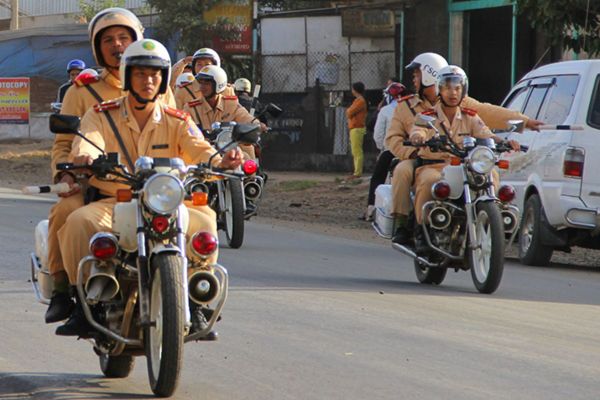Can the Mobile Police Be Mobilized to Cooperate with the Traffic Police in Participating in Patrols and Monitoring of Road Traffic Order and Safety?
Can mobile police be mobilized to cooperate with traffic police in patrolling and controlling road traffic order and safety?
Based on the provisions of Article 32 Circular 32/2023/TT-BCA, which states:
Mobilized forces and conditions for mobilized officers and soldiers
1. Mobilized forces: Other police forces within the People's Police.
2. Conditions for mobilized officers and soldiers
Mobilized officers and soldiers cooperating with the Traffic Police in patrolling and controlling road traffic order and safety must be thoroughly instructed and understand the provisions of road traffic law, regulations on handling administrative violations, decrees on handling administrative violations in the field of road traffic, and regulations on road traffic patrol and control.
Thus, Mobile Police as a component of the People's Police Force can be mobilized to cooperate in patrolling and controlling road traffic order and safety when necessary, to handle traffic violations according to authority.
Additionally, Decree 100/2019/ND-CP also stipulates that Mobile Police have the authority to impose administrative fines in specific cases.

Can mobile police be mobilized to cooperate with traffic police in patrolling and controlling road traffic order and safety? (Image from the Internet)
Can traffic police stop vehicles for inspection if there is no traffic violation?
Based on the provisions of Clause 1, Article 16 Circular 32/2023/TT-BCA, it states:
Stopping vehicles for inspection
1. Traffic police officers on duty conducting patrols and control according to the plan are permitted to stop vehicles for inspection in the following cases:
a) Directly discover or through means and technical professional devices discover and collect evidence of violations of road traffic laws and other legal violations;
b) Following orders, plans for general control of vehicles to ensure road traffic order, safety, social security; plans for patrolling, controlling, handling violations according to specialized topics to ensure road traffic order, safety, social security issued by competent authorities;
c) Written request from the Head, Deputy Head of the investigative agency; written request from relevant functional agencies to stop vehicles for inspection to ensure security, order; fight against crime; prevent natural disasters, fires, explosions; prevent epidemics; rescue and relief operations and other legal violations. The written request must specify the time, route, controlled vehicle, handling measures, and coordination forces;
d) Reports, feedback, petitions, and accusations from organizations and individuals about legal violations of people and vehicles participating in road traffic.
...
Thus, based on the above regulations, from September 15, 2023, traffic police can still stop vehicles for inspection in cases where there is no traffic violation while patrolling and controlling according to the plan in the following cases:
- Implementing orders, plans for general control of vehicles to ensure road traffic order and safety, social security; plans for patrolling, controlling, and handling violations according to specialized topics to ensure road traffic order and safety, social security issued by competent authorities;
- Written request from the Head, Deputy Head of the investigative agency; written request from relevant functional agencies to stop vehicles for inspection to ensure security, order; fighting against crime; preventing natural disasters, fires, explosions; preventing epidemics; rescue and relief operations, and other legal violations. The written request must specify the time, route, controlled vehicle, handling measures, and coordination forces.
What is the procedure for traffic police to conduct inspections?
Based on the provisions of Article 18 Circular 32/2023/TT-BCA, the procedure for traffic police to conduct inspections is implemented in the following steps:
Step 1: Request the vehicle operator to take safety measures and exit the vehicle.
Step 2: Salute according to the People's Police Regulations (except in cases where it is known in advance that the person has committed acts indicating crime, caught in the act, or under pursuit order). When contacting individuals who have committed legal violations, traffic police officers must maintain appropriate posture, manners, and respectful behavior.
Step 3: Inform the vehicle operator and vehicle occupants of the reason for the inspection; request the vehicle operator to present relevant documents or information from electronic identification accounts.
Step 4: Conduct inspections according to Clause 2, Article 12 of Circular 32/2023/TT-BCA:
- Inspect documents related to individuals and vehicles.- Check the traffic participation conditions of the vehicle.- Ensure compliance with road traffic safety laws.- Inspect other relevant contents as stipulated by law.
For passenger vehicles with over 10 seats or vehicles with similar dimensions, the inspection must be carried out directly in the passenger compartment, and the results must be communicated.
Step 5: Conclude the inspection
Traffic police officers report the inspection results to the Team Leader, inform the vehicle operator and vehicle occupants of the inspection results, violations (if any), and the corresponding handling measures.
*Note:
- When there is evidence suggesting that participants in traffic, transport vehicles, or items harbor evidence, tools, documents used for administrative violations, an administrative search of individuals, transport vehicles, and items may be conducted according to the law on handling administrative violations.- If signs of criminal activity are detected, it must be handled according to criminal procedure law.
LawNet